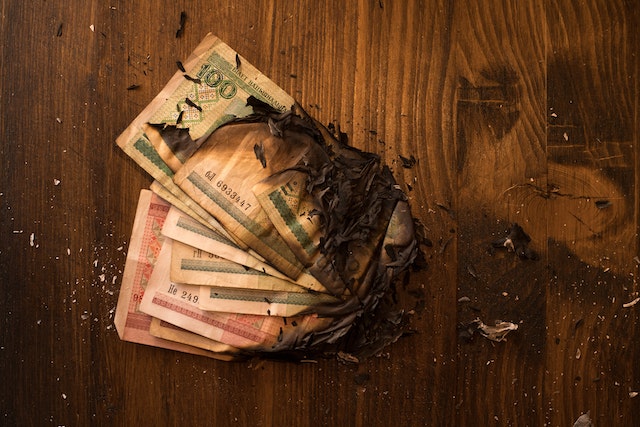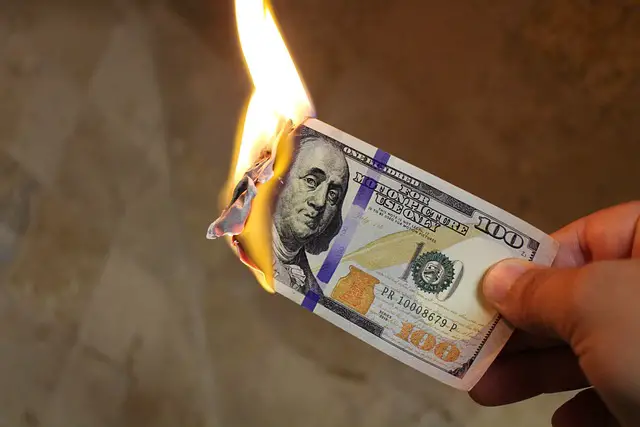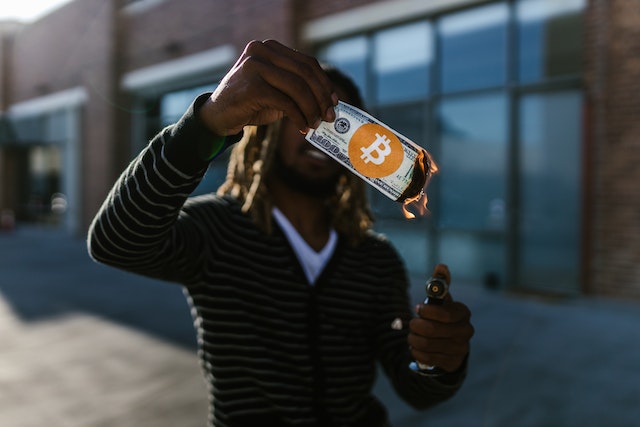
Is it Illegal to Burn Money in the U.S.? Know the Law and Penalties
The contents of this web page are for informational and educational purposes only, and nothing you read is intended to be legal advice. Please review our disclaimer before taking action based upon anything you read or see.
The most valuable thing in modern society is money. It is the component allowing us to advance not just in other sectors but also in human civilization. If you’re considering burning it to dispose of multiple papers and it contains a substantial amount of money, then keep reading. But the concern is, “Is it illegal to burn money in the U.S.?” We are discussing burning money; thus, this is the most crucial issue that comes to mind. Burning cash is a frequent habit, despite how absurd it may seem to the ordinary person.
In the U.S., burning money is against the law and is subject to fines and imprisonment for up to 10 years. Additionally, it is forbidden to flatten a penny or even break a dollar note when a train is on the railroad lines. This post will inform you much on this subject.
Because the federal government uses precious metals to create coins, the rules that make tampering with and debasing money illegally have their origins in this practice. It was not uncommon for thieves to file down or chop off pieces of such coins, keeping the slivers for themselves while using the changed money.
However, the chances of getting charged under federal statutes prohibiting burning cash or tampering with coinage are quite low. First, precious metals are now seldom present in coinage.
Second, desecrating printed money as a protest often contrasts with setting the American flag on fire. The First Amendment of the United States Constitution may regard burning money as protected speech. Come along as we elaborate more on this below.
Why Burning Money is Illegal in the United States

Burning Money Is Illegal in the United States due to the following reasons:
Federal Criminal Statutes
Burning money is illegal, according to U.S. Code Title 18, Section 333, passed in 1948, since it renders it “unfit to be reissued.” If you are discovered setting money on fire, you might get a maximum of six months in prison, a fine, or any combination. Depending on what the court deems appropriate.
Prevent burning money to prevent such terrible effects. This is true whether you are simply one in a million to have enough of it to light part of it on fire for entertainment or it is damaged. For an exchange in the latter scenario, go to the U.S. Bureau of Engraving and Printing.
Environmental Impact
The ecosystem suffers when money is burned. This normally causes the money to deteriorate fast and releases particles contributing to acid rain, exacerbating existing health issues, including asthma, heart disease, and other illnesses. By producing carbon dioxide, it also aids in the global warming process.
Many chemicals are used to produce money, mostly in the printing process. The currency also includes chlorine, which is needed to bleach/remove the color from wood pulp and the inks used for printing.
Dioxins, which build up in the fatty tissues of both people and animals as you burn money, may harm the immune function, interfere with metabolism, and even cause cancer. They can also trigger reproductive and growth disorders.
Additionally, the chemical composition of various sorts of money varies. Some might include acidic materials like hydrochloric acid or sulfuric acid. This makes burning the money challenging since these chemicals might be difficult if they wind up in the incorrect location.
Loss of Value
Since you own that money and have complete control over its usage, it would appear morally and legally acceptable. However, it is against the law to burn money anywhere that someone cannot use. It could be unlawful to burn or dispose of money, whether you reside in the U.S. or another nation.
The fundamental justification is that this behavior will devalue and deface that nation’s currency. Burning cash is prohibited and may put you in dangerous situations according to the law. In other words, anything regarded as defacing, like burning money, would be forbidden.
To Prevent Deflation
The supply of cash may be reduced by burning, which can cause prices to decrease. This is because increased money circulation won’t increase an economy’s production; rather, it will push item prices.
Similarly, customers would have less money if money circulation was reduced by burning. This will cause the demand for products to decline, which will cause deflation. Despite its attractive appearance, deflation may have long-term effects like slower economic development.
To Combat Money Laundering
Another purpose the federal government forbids burning or otherwise desecrating U.S. currency is to combat money laundering. Burning cash is a common method thieves and money launderers use to hide their activities. This is against the law, and there are many repercussions.
To Reduce Fraud
To lessen fraud, it is also forbidden to burn money. There are several repercussions for those who intentionally damage money—in the conventional illustration, igniting money results in their loss. Combustion money diminishes the owner’s value without explicitly aiding any such entity. Fraud tends to be significantly decreased with the ban on this behavior.
Historical Context of Burning Money in the US

Pablo Escobar, the famed drug lord, is said to have burnt over $2 million in the early 1990s to keep his loved ones warm. His son, Sebastian Marroquin, who has modified his name, reported this.
Perhaps the ferocity of the person involved meant no repercussions for this action. It’s also possible that, at the time, American law did not forbid it. However, burning so much money—or any money—has repercussions in many modern nations.
The mutilation and destruction of bank currencies are prohibited in several nations across the globe. The same is true for the United States, where burning money is regarded as a federal felony and is penalized by federal law.
Potential Consequences of Burning Money in the U.S.
Title 18, Chapter 17 of the U.S. Codes imposes steep penalties or prison terms for burning money in the U.S. The federal legislation forbidding the deliberate damage of property also applies to this offense. In these situations, the destruction’s intention is also considered heavily. And if the conduct wasn’t done on purpose, the only grounds for declaring you innocent are an accident or drunkenness.
Alternatives to Burning Money in the U.S.
You need to develop a national bank to take their place rather than burning money. You should only burn paper money, broken coins, or damaged currency notes if you have many of them. The act of discarding worthless currency papers is not legal.
You can donate to charitable organizations if the sum seems too large for you.
Conclusion
You are aware that while your money may technically be yours, you are not permitted to spend it however you, please. You may go to prison for anything like burning cash. Although the money is yours, it may force you to pay penalties or a mix of the two.
My Advice
If you live in the United States and have some cash to burn, you should think carefully before doing so. Because it violates Title 18, Section 333 of the U.S. Code of Disfigurement of National Bank Obligations, burning money is entirely forbidden in the USA.
If you break this legislation, you might spend up to 10 years in jail and have to pay penalties. Avoid burning money if you have a lot of money to spend but are having trouble using it. You might instead give the money to one of the many banks or charities.
References
- https://en.wikipedia.org/wiki/Money_burning
- https://www.economicshelp.org/blog/10912/economics/what-happens-when-you-destroy-money/
- https://en.wikipedia.org/wiki/First_Amendment_to_the_United_States_Constitution
- https://www.mtsu.edu/first-amendment/page/first-amendment-timeline
- https://www.freedomforum.org/is-your-speech-protected-by-the-first-amendment/
- https://www.law.cornell.edu/uscode/text/18/333
- https://indianexpress.com/article/news-archive/print/drug-lord-escobar-burned-1-5-mn-to-keep-daughter-warm/
- https://www.reuters.com/article/us-colombia-escobar-idCATRE5AA2J920091111
- https://law.justia.com/codes/us/2011/title-18/part-i/chapter-17/section-333

I’m a driven and accomplished law graduate and post-graduate, passionate about sharing my legal expertise via my blog. I hold a Bachelor’s degree in Law from the University of London (UK) and a Master’s in Law from the University of Derby (UK). Both gave me the foundational knowledge and skills to excel in my chosen career path.
Throughout my academic journey, I have gained extensive knowledge in various fields of Law, including Corporate and Business Law in the USA, Criminal Law, International Law, US Copyright law, and most importantly, American Constitutional law.


Comments are closed.